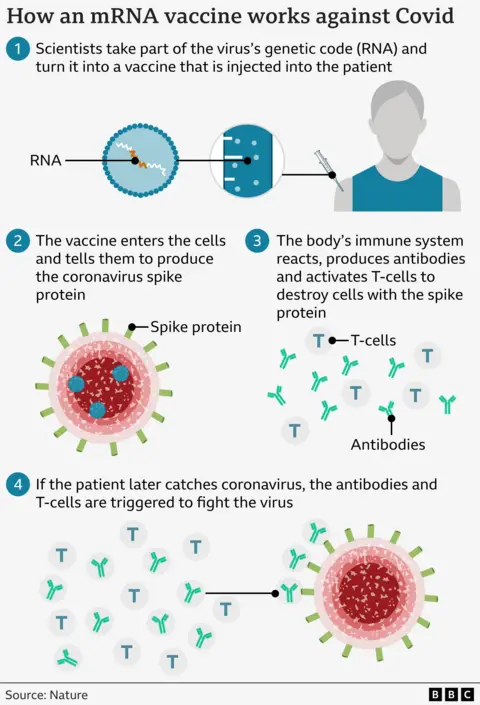 Getty images
Getty imagesMRNA vaccines were manipulated as a medical miracle, which saved his life during the Kovid epidemic, but now America is pulling them back from researching them.
US Health Secretary Robert F. Kennedy Junior has canceled 22 projects – the price of $ 500 meters (£ 376m) in funding – to deal with infections like Kovid and Flu.
So is Kennedy – Perhaps the most famous vaccine in the country is doubt – a point, or is he doing a monumental missing?
Prof. Adam Finn, vaccine researcher at Bristol University, says “It is a bit of both” but the MRNA technique is “stupid” and possibly a “frightening error”.
Why let’s unplug.
Kennedy says he has reviewed science on MRNA vaccines, concluding that “data shows that these vaccines fail to effectively protect from upper respiratory infections such as covids and flu”.
Instead, they say, he will “rescue, comprehensive vaccine platforms who are also effective as virus muted”.
So are MRNA vaccines safe? Are they effective? Will other vaccine technologies be better?
And another question is where MRNA vaccines should fit in pantians of other vaccine technologies – because there are many:
- Passive vaccine Use original viruses or bacteria, kill it, and use it to train the immune system – such as annual flu shot
- Seen vaccines Do not kill infectious agent, but make it weak, so it causes a mild infection – such as MMR (measles, kanthamala and rubella) vaccine
- Conjunction vaccine Use bits of protein or sugar from bug, so it triggers an immune response without infection – such as for types of meningitis
- mRNA vaccine Use a piece of genetic code that temporarily instructs the body to make parts of the virus, and the immune system reacts to it
Each has the advantages and disadvantages, but Professor Finn argues that we “overheep” MRNA vaccines “during epidemics for exclusion of other approaches, and now is a process of adjustment.
“But to swing the pendulum so far that the mRNA is useless and it should not be developed or considered better, it is equally stupid, it works remarkable,” they say.

Do MRNA vaccines work?
Prof. Andrew Pollard of the Oxford Vaccine Group says that MRNA does not protect against upper respiratory infections such as TK Kovid and Flu, leaving posts as the head of the Joint Committee on vaccination and vaccination (JCVI) soon, which advises the UK government.
The vaccine was shown to provide protection – to keep people alive and out of hospital – both in clinical trials and then during intensive monitoring that they performed vaccines when they rolled out worldwide.
In the first year of vaccination during Kovid epidemic, it was estimated that PFIZER/Biontech MRNA vaccine rescued alone About 6 million lives,
There was a small number of cases of inflammation of heart tissue against it – called myocarditis – especially in young men.
“Very rare side effects against the huge benefits of technology should be balanced,” says Prof. Pollard.
The epidemic was an era when the world was focused on a single-minded focus on Kovid and the rollouts of the vaccines were monitored intensified. The opinion of consensus remains that he did well than the loss.
But this does not mean that they are an ideal technique.
 Getty images
Getty imagesMRNA covid vaccines train the immune system to target just one protein from the entire virus. If that protein changes or changes in coreonwirus, the safety of the body decreases.
We have seen the results of it – there is a need to update the immune women and vaccines.
A theoretical argument is that a separate vaccine approach – such as using the entire virus – will give better protection, as the immune system will be more to target.
However, Prof. Pollard says that MRNA performs better than inactive people while dealing with vaccines.
He says that perhaps the way he is made below – and the fact that the process of killing the virus also “changes viral protein, so MRNA has a low stimulation of the immune system compared to vaccines”.
The need to update the vaccines is not a failure of the MRNA technology that can easily be solved by pivying from one technique to another – instead, it is below for the fundamental nature of some viruses.
The same measles or HPV (human papilloma virus) vaccines have been effective for decades and showed no indication of failure because the genetic codes of the virus are more stable in each case.
But some viruses remain in a permanent position of flow.
The flu, for example, is not a virus – rather a frequent shifting goal instead. At any time, a stress will be in ascending and will be most likely to cause winter discomfort.
In flu, passive flu injections that are given to adults are updated every year – as is a live vaccine that children are given as nasal sprays. A future MRNA form of flu vaccine will serve in the same way.
“The talk about keeping with variants is about all technologies, not only MRNA.”
MRNA is ‘on the streets’ when speed is required
A legitimate scientific question is the vaccine technique is used for which disease.
The reason for anxiety among scientists is that drawing MRNA research means that we do not have vaccines many times when we need to do what no other technology can do.
Prof. Pollard says: “I don’t think there are evidence that they are much better for protection, but where RNA is on the roads, everything else is responding to the outbreak.”
The world is highly drilled in making new flu vaccines every year. But still, there is a six -month process of determining to target new flu strains, which increases the vaccine on a scale in chicken eggs and then distributes it. The brand’s new vaccines take even more time.
But with MRNA, you may have a new vaccine in six to eight weeks, and then a few months later tens or hundreds of crores of doses.
Some of their funding projects in the US were preparing for a bird flu epidemic. He is jumping into a wide range of animals including viruses, H5N1, destructive bird population and American cattle.
“This is not understood and if we receive a human epidemic of bird flu, it can be seen as a terrible error,” says pro fin.
But America’s influence can be felt more widely than MRNA research.
What effect does this step affect the current vaccines, mRNA or otherwise? How does this affect the world when America is one of the most influential countries in medical research? And will it be a knock -on effect on other types of MRNA technology, such as using an approach to treat cancer vaccines or rare genetic diseases?
Professor Pollard raised another question after RFK JR’s move: “Does it put all of us at risk if a big market is changing its back on RNA?
“This is one of the most important techniques, we will see this century for infectious disease, biotheraputic agents for rare disease and seriously cancer. This is a message that I am upset about.”
